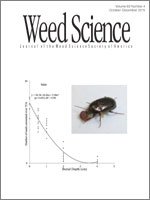Weeds represent a major cause of agricultural losses worldwide. Most weeds share a common set of life history characteristics that predispose them to weediness, two of which are self-compatibility, which allows for ease of colonization through reproductive assurance, and high trait plasticity, which allows for tolerance of a wide variety of environments and abiotic conditions. However, self-fertilization typically comes at the cost of inbreeding depression. This study investigates the role of inbreeding depression and trait plasticity under abiotic stress in the tall morningglory, a widespread self-compatible agricultural weed in the southeastern United States. Results show very little inbreeding depression in this species, likely due to purging of deleterious alleles through repeated founder events in agricultural landscapes. In contrast, abiotic stress induced substantial plasticity in ecophysiological traits, reproductive traits, and biomass allocation. In terms of performance, drought sharply impacted reproduction but not vegetative growth, and nitrogen limitation sharply impacted both. These findings are applicable to the control of weedy morningglory and underscore the usefulness of evolutionary ecology to weed management.
Nomenclature: Tall morningglory, Ipomoea purpurea (L.) Roth.





